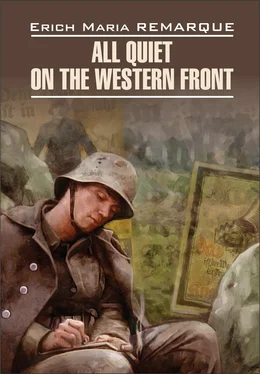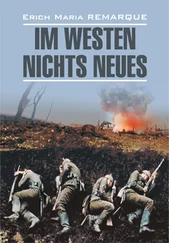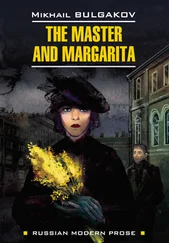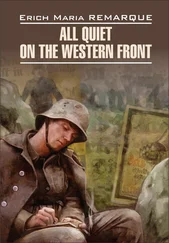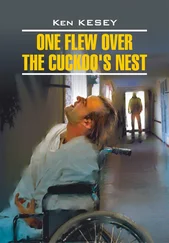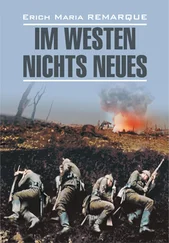From then on he left us in peace. He went on calling us miserable little swine, of course. But there was respect in his voice.
There were plenty of decent drill corporals around, men who were more reasonable; the decent ones were even in the majority. More than anything else every one of them wanted to hang on to his safe job here at home for as long as possible – and they could only do that by being tough with recruits.
In the process we probably picked up every little detail of parade-ground drill that there was, and often we were so angry that it brought us to screaming pitch. It made a good few of us ill, and one of us, Wolf, actually died of pneumonia. But we would have been ashamed of ourselves if we had thrown in the towel [58] if we had thrown in the towel – если бы мы сдались
. We became tough, suspicious, hardhearted, vengeful and rough – and a good thing too, because they were just the qualities we needed. If they had sent us out into the trenches without this kind of training, then probably most of us would have gone mad. But this way we were prepared for what was waiting for us.
We didn’t break; we adapted. The fact that we were only twenty helped us to do that, even though it made other things so difficult. But most important of all, we developed a firm, practical feeling of solidarity, which grew, on the battlefield, into the best thing that the war produced – comradeship in arms.
I’m sitting by Kemmerich’s bed. He is fading more and more visibly. There’s a lot of to-ing and fro-ing around us. [59] There’s a lot of to-ing and fro-ing around us – Вокруг нас – шумная суматоха
A hospital train has come in, and they are sorting out any of the wounded that can be moved. A doctor goes past Kemmerich’s bed and doesn’t even look at him.
‘Next time round, Franz,’ I tell him.
He lifts himself up on one elbow, propped against the pillow. ‘They’ve amputated my leg.’
So now he has realized after all. I nod and by way of a response I say, ‘You want to be glad that you got away with that.’
He doesn’t say anything.
I carry on talking. ‘It could have been both your legs, Franz. Wegler lost his right arm. That’s a lot worse. And it means you’ll go home.’
He looks at me. ‘Do you think so?’
‘Of course I do.’
He says it again, ‘Do you think so?’
‘Of course you will, Franz. You just have to recover from the operation.’
He signals to me to come a bit closer. I lean over him and he whispers, ‘I don’t reckon I will.’
‘Don’t talk such rubbish, Franz, you’ll see yourself that I’m right in a couple of days. It’s not such a big thing, having a leg amputated. They patch up a lot of worse things here.’
He lifts his hand. ‘Just have a look at my fingers.’
‘That’s all because of the operation. Just get a decent amount of grub into you, and you’ll pick up again. Are they feeding you properly?’
He points to a dish, but it is still half full. I begin to get worked up. ‘Franz, you’ve got to eat. Eating is the main thing. And the food’s pretty good here.’
He shakes his head. After a while he says slowly, ‘I used to want to be a forester.’
I try to reassure him. ‘You still can be. They can make amazing artificial limbs these days – you hardly notice that they aren’t real. They fix them on to the muscles. You can move the fingers on artificial hands and you can use them, you can even write. And besides, they are making improvements all the time.’
He lies there for a while without a word. Then he says, ‘You can take my flying boots for Muller.’
I nod and try to think of something to say that will cheer him up. His lips are pallid, his mouth has got bigger and his teeth look very prominent, as if they were made of chalk. His flesh is melting away, his forehead is higher, his cheekbones more pronounced. The skeleton is working its way to the surface. His eyes are sinking already. In a few hours it will all be over.
He isn’t the first one I have seen like this; but we grew up together, and that always makes it different. I’ve copied school exercises from him. In school he usually wore a brown jacket with a belt, with parts of the sleeves worn smooth. And he was the only one of us that could do a full arm-turn on the high bar [60] a full arm-turn on the high bar – крутить «солнце» на перекладине
. His hair flew into his face like silk when he did it. Kantorek was proud of him for being able to do it. But he couldn’t stand cigarettes. His skin was very white, and there was something feminine about him.
I glance down at my own boots. They are big and heavy and my trousers are tucked into them; standing up, you look solid and strong in these wide-legged things. But when we undress for swimming we suddenly have thin legs and narrow shoulders. We aren’t soldiers any more then, we are almost schoolboys again; nobody would believe that we could carry a full pack. It is really strange when we are naked; we are civilians again, and we almost feel like civilians.
Whenever we went swimming, Franz Kemmerich used to look as small and slim as a child. Now he is lying there – and for what reason? Everybody in the whole world ought to be made to walk past his bed and be told: ‘This is Franz Kemmerich, he’s nineteen and a half, and he doesn’t want to die! Don’t let him die!’
My thoughts run wild. This smell of carbolic and gangrene clogs the lungs, like thick, suffocating porridge.
It gets dark. Kemmerich’s face gets paler, it stands out against his pillow and is so white that it looks luminous. He makes a small movement with his mouth. I get closer to him. He whispers, ‘If you find my watch, send it home.’
I don’t argue. There is no point any more. He is beyond convincing. I’m sick with helplessness. That forehead, sunk in at the temples, that mouth, which is all teeth now, that thin, sharp nose. And the flit, tearful woman at home that I shall have to write to – I wish I had that job behind me already.
Hospital orderlies move about with bottles and buckets. One comes up to us, glances at Kemmerich speculatively and goes away again. He is obviously waiting – probably he needs the bed.
I get close to Franz and start to talk, as if that could save him: ‘Maybe you’ll finish up in that convalescent home [61] convalescent home – санаторий для выздоравливающих
in Klosterberg, Franz, up where the big houses are. Then you’ll be able to look out over the fields from your window, right across to the two trees on the horizon. It’s the best time now, when the corn is ripening, and the fields look like mother-of-pearl [62] mother-of-pearl – перламутр
when the evening sun is on them. And the row of poplars by the stream where we used to catch sticklebacks. You can get yourself an aquarium again and breed fish, and you can go out without having to ask permission and you can even play the piano again if you want to.’
I bend down over his face, which is now in shadow. He is still breathing, but faintly. His face is wet, he is crying. So much for my stupid chattering.
‘Come on, Franz —’ I put my arm around his shoulder and my face is close to his. ‘Do you want to get some sleep now?’
He doesn’t answer. The tears are running down his cheeks. I would like to wipe them away, but my handkerchief is too dirty.
An hour passes. I sit there, tense and watching his every movement, in case he might want to say something else. If only he would open his mouth wide and scream. But he just weeps, his head turned away. He doesn’t talk about his mother or his brothers and sisters; he doesn’t say anything. All that is probably already far behind him; now he is all alone with his life of nineteen short years, and he is crying because it is slipping away from him.
Читать дальше
Конец ознакомительного отрывка
Купить книгу
